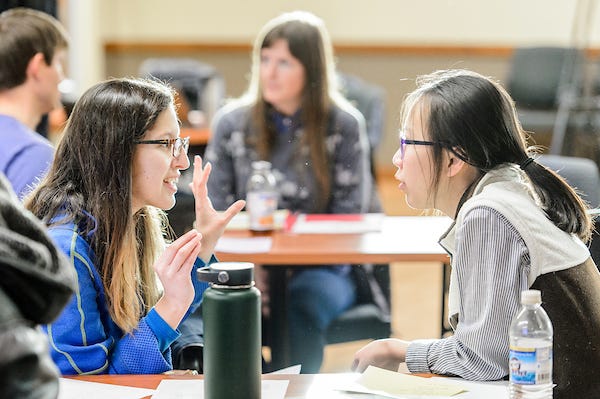The trees are turning yellow, puddles are forming, the sidewalks are stained with black walnuts and crushed maple leaves, and I’ve been slow roasting the last cherry tomatoes of the season. Here are some early autumn updates from the Center as we find ourselves absorbed in exciting new projects.
— Carrie, program director
In this newsletter:
Philosophy of education: Is there a canon?
Teaching: Structured academic controversy (SAC)
Guest post: Student vox pops
News & Events: Lecture series, job posting, conferences

Is There a Canon?
— by Harry Brighouse

Here are two ways of thinking about philosophy of anything, and philosophy of education in particular.
1. As a body of knowledge.
The first, which I think is the way that lots of people who took Philosophy 101 but went no further in philosophy think about it, is that it consists of a body of knowledge. Old (in fact, mostly dead) philosophers (who, in addition to being dead, were mostly white and male) wrote important books, and philosophy is about mastering what they thought and the arguments made. Learning I’m a philosophy professor, people often say, “and which philosopher do you study?” (or, worse, “which philosopher do you follow?”). Doing philosophy of whatever, on this view, involves mastering a canon. So, in philosophy of education, the canon might involve Isocrates, Plato, Rousseau, John Dewey and, possibly, Maria Montessori and/or Nel Noddings.
2. As a set of intellectual resources.
The other way is the way that, I think, philosophers tend to think of philosophy. There isn’t, actually, some canonical body of knowledge that needs to be mastered, and we don’t necessarily study (and certainly don’t follow) particular philosophers, dead, living, male, female, white, or black. Instead we think of philosophy as a practice of investigating very particular kinds of problems, with well-developed intellectual resources. Of course, many of the great philosophers in the canon—and, to be honest, many philosophers not in the canon, great or otherwise—have developed some of these resources, and have insights into tackling the problems that we can learn from reading and studying them. But often, we can learn the resources without appealing to the canon. (One of the most brilliant and most accomplished philosophers I know took a Philosophy 101 course which contained no canonical readings at all, and still sometimes comments to me that she doesn’t know a lot of basic stuff that’s normally in 101, to which my thought is always, “Well, it doesn’t seem to have done you any harm”).
But often, we can learn the resources without appealing to the canon.
Philosophical problems are, to put it crudely, problems that can’t be addressed by any empirical methods and aren’t mathematics. And the intellectual resources I have in mind are conceptual analysis, reflective equilibrium, some of the more basic tools of logic and informal argumentation, and careful attention to fine distinctions, which help with many sorts of problems but are especially suited to philosophy. In philosophy of education, we think about questions like what kinds of aims schools should have for their students, what weight those should have relative to one another, how educational resources should be distributed, and who should have decision-making authority about those questions, as well as what counts as knowledge and how usefully to distinguish cognitive and non-cognitive skills.
At the Center, we tend to think about philosophy of education in this second way. We tend to take our cues from the real world of educational policy and practice, and are driven to understand and address primarily the ethical questions that arise in those contexts. Yes, we are standing on the shoulders of the giants, but we’re not really looking at them: we’re trying to give teachers, leaders, and policymakers resources to think through the problems that face them.
Vox Pops
We’re working on a new podcast episode and teaching guide about sex ed with our undergraduate curriculum team, Anna and Teresa. On one recent September Saturday, they went out to do vox pop interviews with students on campus. You’ll get to hear more in the episode, which will be out this fall.
Structured Academic Controversy: A Variant
— by Harry Brighouse (Originally published on Crooked Timber)
A grad student advisee of mine who had previously been a high school teacher introduced me to the teaching technique Structured Academic Controversy (SAC) when I observed her teaching a class for future secondary social studies teachers. I’d never seen it used before in class, and have come to find a variant of it (but not the actual variant she used) a very useful strategy in quite specific conditions.
Structured Academic Controversy (Classic)
Here’s roughly how she did it:
Students were given a controversial proposition. They were divided into groups of 4, and each of those groups was further divided into pairs.
Within each group, one pair received materials favoring the proposition; the other pair received materials opposing it. Students read the material and discussed the most salient points of the argument to present.
Students presented their argument. Each pair had 3minutes to present their ideas. After 3-minute presentations, each pair had a minute to rebut.
Then they swapped sides: the favoring pair now had the opposing materials, and vice versa, and they went through the whole process again.
Then students reported back to the whole class.
The way the exercise is described above assumes that the students have not done any prior relevant reading or research. And its purpose when used in high school is really to get students to see all sides of the issue, and internalize the reasons that are given in the supporting and opposing material. It worked pretty well when my graduate student did it in my class, partly because we hadn’t, in fact, assigned material pertaining directly to the proposition that we were asking them to consider. But when I tried it a couple more times it didn’t work so well.
Here’s why. First, I generally do assign reading pertaining to whatever I am going to want the students to think about in class and at least in small classes they mostly do it. I want them to draw on those readings, not to, essentially, choose reasons from a handout. Second, the swapping sides didn’t work at all. Students reported that the exchange after sides were swapped was exactly the same as the exchange before. This is fine if you are trying to get them to internalize what is on the sheet, but not if you are trying to trigger authentic exploration of the issues. I now use an adapted version of the SAC that seems to work much better with my students, in my circumstances.
SAC (Adapted)
Students are given a proposition and divided into groups of 4, each of which is divided into pairs—one of which is going to support, the other of which will oppose, the proposition.
The pairs have 5 minutes to come up with their arguments.
Pair A spends 3 minutes giving its arguments to Pair B.
Pair B spends 3 minutes giving its arguments to Pair A.
They discuss the arguments they have each given, staying in role, for 5 minutes. They continue for another 5 minutes, permitted to break out of their roles and say whatever they now, on reflection, think.
We continue the discussion in the whole class, drawing on what they have said in their groups.
I vary the times allocated to each task depending on the topic and how much time is available, and often drop the stage at which they have to stay in role. Students frequently report that they are glad that they were made to argue for a side they didn’t agree with, because it enabled them to see the why somebody might believe it. And the SAC is especially helpful for one particular kind of issue: one for which there is not much authentic disagreement in the room.
Most first-year students have never considered that state-sponsored marriage might be a bad idea, and for that reason they don’t really understand why it might be a good idea.
Here are a couple of examples:
When I teach about whether the government should be involved in marriage, I use a short paper by Mary Shanley, called Just Marriage, and another by my late colleague Claudia Card called Against Marriage and Motherhood. Most first-year students have never considered that state-sponsored marriage might be a bad idea, and for that reason they don’t really understand why it might be a good idea. I found that open-ended discussions quickly descended into me playing devil’s advocate on Card’s behalf, and being the center of the discussion. But when they do the SAC half the class has to support her position for at least a while, which gets the ideas a good airing without me being at the center of things. And the reasons and arguments get a fair hearing in the whole class discussion.
I’ve used, with graduate students (in Philosophy and Education), an article by Stanley Fish called “Professor, Do Your Job,” arguing for a very austere view of what the aims of higher education should be. Personally, while I disagree with Fish’s position, I’ve found considering his arguments extremely illuminating. I’ve found that in open-ended discussion, students (especially the Education graduate students) are very loathe to take him seriously at all. But in the context of a SAC in which some are forced, initially, to take his side, the subsequent whole class discussion is much richer and more subtle, and most people go away actually understanding what Fish is arguing (even if they still disagree).
News & Events
Wisconsin Idea Lecture Series: UW-Madison and the UW system as a whole are defined in part by The Wisconsin Idea—the idea that the university should serve not only the people who attend but the the people of the of Wisconsin more broadly. Every fall, UW-Madison runs a Wisconsin Idea Lecture Series. As you can see, this season, many of the talks have a philosophical edge to them. The lectures are Tuesdays from 6-7:15 pm in 2340 Humanities, and everyone is welcome to attend!
Faculty job posting: The department of Educational Policy Studies at UW-Madison is hiring a professor in philosophy of education.
Fall conferences: You can catch us at two fall conferences this year: NEPES in NYC and NAAPE in IL. Come say hi!
Keeping in touch: We’re consolidating our communications. Substack will replace our current X/Twitter account. Subscribe to stay in touch!
Best,
Center for Ethics & Education







Thank you!!